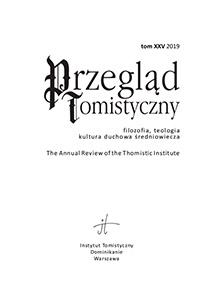MARIA BURGER, Kelf-Knowledge by Cognition of God. The Treatise of the Imago Dei in Albert the Great

Volume XXV: 2019
Philosophy — Theology — Spiritual culture of the Middle Ages
ISSN 0860-0015
e-ISSN 2544-1000
SUMMARY
TIn his Sentences Commentary, Albert the Great explains the Imago Dei in reference to Augustin’s De trinitate. Memory, intellect, and will are the essential parts of the soul analyzed in this treatise. While researching the cognition of God, the focus switches to an examination of the possibility of human self-knowledge. Albert compares the powers of the soul to Aristotelian natural philosophy, as portrayed in his anthropological work De homine. Although there is an obvious contradiction between the two sciences, theology and natural philosophy, Albert succeeded in coloring Augustinian thought with peripatetic terms. First, he describes the powers in a rather Augustinian view: The memory holds an innate habit of the true and the good that is the soul, and the true and the good that is God. Thus the intellect by intuition is conscious of the soul and of God in a constant relation. The will has to focus on these objects presented by memory and intellect. But then Albert gradually applies the Aristotelian intellectus agens to the Augustinian intelligentia. A short digression to the Alexander’s of Aphrodisias treatise De intellectu et intellcto emerges as the first sign of the further development of Albert’s view. In his later work, he prefers a self-knowledge of the intellect by the way of understanding all other intelligibles.
